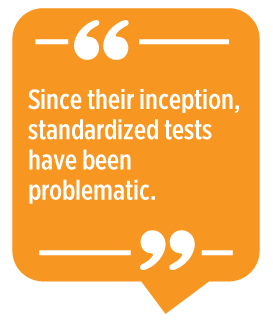|
 Over the past year and a half, state and local education
agencies across the country had to make decision after decision: How
much live, synchronous teaching should we be requiring? When should we open up
the school buildings again? What should grading policies be while we are in the
middle of a global pandemic? How can we keep everyone safe? Many of
these questions were arguably addressing a temporary situation directly related
to the COVID-19 pandemic. Over the past year and a half, state and local education
agencies across the country had to make decision after decision: How
much live, synchronous teaching should we be requiring? When should we open up
the school buildings again? What should grading policies be while we are in the
middle of a global pandemic? How can we keep everyone safe? Many of
these questions were arguably addressing a temporary situation directly related
to the COVID-19 pandemic.
Last winter,
another question that was raised was the debate over whether or not the federal
government should cancel
standardized testing. Similarly to the aforementioned questions, the
#CancelTheTest conversation was largely treated as a temporary situation: Should schools delay
testing because of issues of health and safety?
Should we just cancel 20/21 testing outright since the data
will be unreliable anyway? What if the data are
just used to further highlight
inequities for historically marginalized
students that we already know exist?
While we
believe in the essential nature of thoughtful, useful assessment, the
#CancelTheTest narrative that arose amidst the pandemic was missing the larger
point that our large-scale assessment measures were inequitable and
insufficient even before the pandemic—and that is not a normal to which we hope
to return. Here, we illustrate problems with standardized testing that we
believe are missing from the #CancelTheTest conversation. Given our backgrounds
in working with classified English learners (ELs), who make
up to 10% of the U.S. public school population, and in an effort to
normalize the experience of multilingual students, our following examples
center on these students.
 Testing Culture Has
Always Been Problematic Testing Culture Has
Always Been Problematic
Since their
inception, standardized tests have been problematic. They are used for
high-stakes decisions: grade level progression, tracking, high school
graduation, and evaluation of “effectiveness” of teachers and schools. Relying
heavily on what is only a simplistic snapshot of a student’s academic performance
is, at best, a way to make narrowly informed decisions. Yet considerable time
and money are being dedicated to preparing and administering these tests while
funding for the education of the increasing number of ELs has
remained flat.
Additionally, the data that any
standardized test does capture are often presented without enough consideration
to the variation in school and district resources, which tend to be more
limited for schools that educate large numbers of ELs. There is also evidence
that standardized tests do not accurately measure multilingual students’
academic performance and that the very nature of standardized
tests is racist. This should be the core of the #CancelTheTest
conversation.
#CancelTheTest = Cancel Some Standardized Tests
The
#CancelTheTest narrative also centered around the idea that the default student
is a monolingual student in the general education classroom. Consequently, the
tests that were being targeted for cancellation are those that all students are mandated to take, such as
the
MCAS
in our home state of Massachusetts. In contrast, #CancelTheTest
advocates rarely acknowledged the additional standardized assessments that
classified ELs encounter each year. For example, the
40 states that are members of the WIDA Consortium use the ACCESS to
determine an EL’s progress toward proficiency in English. The ACCESS is
typically administered in January and February, right before general education
standardized tests, which means that an EL may potentially spend weeks to
months within a “testing window.”
While some
called for delaying
or outright cancellation
of ACCESS for 20/21, few called
for the simultaneous cancellation of both core subject and English proficiency
testing. With the conversation focused primarily on the general
population, we avoid the harder conversation of how to address inequities
across different populations of students, especially those who are tested
differently or in addition to statewide measures. Instead of talking about the
need to reform our testing practices, the calls for generic test cancellation
have had the effect of sweeping this conversation under the rug.
Monitoring “Learning
Loss” Detracts From Discussions of Equitable Systems
The idea of
“learning loss” or the “COVID slide” is a common argument by those who are for
testing and existed even prior to the pandemic in discussions about
the “summer slide” or extending the school day or school year. Ironically,
given their high-stakes nature, standardized tests often push teachers into
“test
prep mode,” which ultimately takes time away from learning. The “learning loss” narrative is especially
harmful for ELs, for whom it creates a double deficit narrative—an
argument that language assessments are necessary in order to monitor English
language maintenance and also an argument for the general tests to monitor
“learning loss.” Ultimately, we wonder what is the point of monitoring if the
data are only used to further position students as deficient—and if we are not
going to do anything to reform the systems that lead to the supposed “learning
loss”?

Let’s Just Cancel Outright!
Ultimately,
in response to a
mandate from the U.S. Department of Education, state and local
education agencies made decisions to move
forward with standardized testing, with some modifications
and options regarding scheduling, scope of tests, and parental
opt-out. However, we urge education stakeholders to use this moment in time to
consider the questions, Why not just cancel standardized testing
outright? Why not use this time to reimagine different policies and ways of
doing school? The insistence on returning to “normal” not only
disregarded the idea that annual high-stakes tests have always been
problematic, but also the fact that existing problems will only continue to
grow as the student population becomes increasingly diverse. It is time to put
the resources now being needlessly expended on standardized testing into
reimagining schools for the future.
Prior to the
pandemic, we worked together with teachers, students, and families to imagine a
schooling system that is more equitable and responsive to multilingual
learners. It seems short-sighted to now fight our way back to the same world we
found inequitable before the pandemic. The world pushed us to reimagine schools
this past year. What a shame it would be to look backward instead of imagining
the world of schools we know it is possible to build.
Christine Montecillo
Leider is a clinical assistant professor of
language education in the Wheelock College of Education and Human Development
at Boston University. Her research focuses on teacher education and
understanding how systems of policy and teacher instruction shape the education
experience for culturally and linguistically diverse students.
Christina L.
Dobbs is an assistant professor of English
education in the Wheelock College of Education and Human Development at Boston
University. Her research focuses on adolescent writing in the disciplines,
academic language, disciplinary literacy, and teacher professional
learning.
Johanna
M. Tigert is assistant professor of curriculum
and instruction at the University of Massachusetts Lowell. Her research focuses
on students’ right to maintain their home languages as well as on preparing
content area teachers to effectively meet the needs of multilingual
students. |